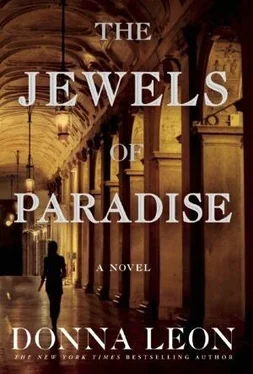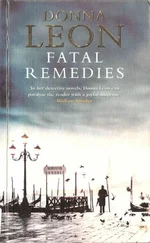Nudged by curiosity about when she would be able to begin her research, Caterina asked, “Did Dottor Moretti tell you when they’d come to open the chests?”
“Noon,” Roseanna said and looked at her watch. Then, sounding like a guilty schoolgirl and not at all like the acting director of the Fondazione Musicale Italo-Tedesca, she said, “We better get back.”
THEY HAD BEEN IN ROSEANNA’S OFFICE ONLY A FEW MINUTES when they heard the front door open and close. Footsteps approached, and then Dottor Moretti was in the doorway, just as she remembered him: dark gray suit with a faint stripe of lighter gray, dark blue tie with a stripe so discreet as to reveal itself only under torture. Caterina was certain he would be able to comb his hair in the reflection from his shoes, were it not that a man such as Dottor Moretti would never comb his hair in public. He’d give it a discreet tap, perhaps a faint stroke in the wake of a heavy wind. But a comb? Never.
He was a tidy man, not tall and not short, a few centimeters taller than she. His hair, neither dark nor light, was thick and cut short, already turning white at the temples. The oval lenses of his gold-framed glasses were so clean that she wondered if he wore a new pair every day. His nose was narrow and straight, his eyes a very pale blue, hardly the eyes of the cliché Italian, though perhaps those of the cliché Veneziano. She doubted, however, that dialect ever passed those lips; in the few conversations they had had, he had used an easy elegance of language, as if he had chosen to speak as an adult from his very first words. She had no idea of what part of the country he came from, and his speech provided no clue.
A gray woolen topcoat was folded over his arm, and the other hand held the briefcase she had noticed before, smooth brown leather with twin brass locks that looked as though someone gave them a very careful buffing at least once a week. Caterina, a great admirer of men’s clothing and often of the men who wore it, coveted the bag.
Dottor Moretti looked to be in his early forties, though the faint wrinkles around his eyes allowed of the possibility that the number might be greater. He seemed to smile only when a remark amused him; Caterina had found herself, when last they spoke, trying to make him smile, perhaps even to laugh. It had taken her no time to realize that he was responsive to language used well. As to his feelings about music, she had no idea.
“Signore,” he said with a small bow toward both of them that, had another man made it, would have been faintly ridiculous. As made by Dottor Moretti, it was a show of respect and attention, meant perhaps to be read as a man’s declaration that he lived to serve these ladies’ wishes. Caterina, remembering that he was a lawyer, dismissed that possibility and chose to read it as an old-fashioned gesture from that marvel of marvels, an old-fashioned man.
“ Dottore, ” she said, getting to her feet and extending her hand. “A great pleasure to see you again.”
“The pleasure is once more entirely mine, Dottoressa,” he said, releasing her hand. He turned immediately and offered it to Roseanna, who rose halfway from her desk to take it, saying only, “ Buon giorno, Dottore .”
Dottor Moretti set his briefcase on the floor and leaned it against Roseanna’s desk. She in turn gave a half wave, half shrug that presented the surface of her desk as the one place where he might possibly sit in this two-chaired room. Caterina was interested to see how he would react. He did not surprise her. He folded his coat and set it neatly on the desk, then leaned back against it and folded his arms.
“I’m glad you’re both here,” he began. “Signor Stievani and Signor Scapinelli should arrive at noon. This gives me the chance to speak to you both before they get here.”
“To tell us what?” Roseanna asked. So far, Caterina noted, nothing she said to Moretti had required her to choose between the polite or the familiar form of address. Linguistically, then, they could be friends, they could be enemies, they could be lovers. Roseanna’s manner with him, however, suggested equal parts of interest and deference, effectively eliminating the second possibility.
Ignoring her remark, Dottor Moretti continued. “They’re very eager for Dottoressa Pellegrini to begin work.”
“Today, I hope,” Caterina said. Did he think she had stopped in to borrow a cup of sugar from Roseanna?
“Yes.”
“The sooner she reads through it all, the sooner they can stop paying her salary,” Roseanna observed in a dead level voice entirely free of irony or sarcasm. Time is money, she was Venetian: that’s the way things are.
Ignoring Roseanna’s comment, he asked Caterina, “Do you have any objection to beginning so soon, Dottoressa?”
She smiled. “Quite the opposite, Dottore. I’m very eager to begin and discover what treasures . . .” she began, giving the briefest pause, “. . . await us in those chests.”
His glance was sudden, and he turned it immediately into a smile. “I compliment you for your energy and eagerness, Dottoressa. I’m sure we all look forward to the results of your research.”
“That can’t be all those two want,” Roseanna said. Dottor Moretti gave her a long assessing look, as if surprised at this unwonted frankness in front of the researcher who, like him, was meant to be entirely neutral. Saying nothing, he bent down and snapped open his briefcase. He pulled out some papers and handed one to Caterina, keeping one for himself. “I’ve spoken to the two . . .”—here he gave a pause even more infinitesimal than Caterina’s had been—“. . . gentlemen, about the procedure for the research.”
“Procedure?” Roseanna asked before Caterina could speak.
“If you’ll take a look,” he said, raising the paper and peering over the top of his glasses to speak to Caterina, “you’ll see written what I’ve already told you, that they want written reports.” He glanced back at the paper and read aloud, “‘. . . With a summary of the documents read and translations of any that might refer to our deceased relative’s desires regarding the disposition of his worldly assets.’”
Caterina decided to enjoy the words, which the cousins must have learned from Dottor Moretti: “deceased relative”; “disposition of his worldly assets.” Ah, what a marvel language was, and blessed they who respected it.
“The Dottoressa is not to have private or personal contact with either of the two . . .”—again that pause—“. . . gentlemen. In the event that she has information to convey or in response to any request from either of the two parties that she provide further information about the documents, it must be provided to me and the two parties at the same time. Further, all emails must go through me.” He glanced at Caterina, who nodded in understanding and acceptance, deciding to wait before asking about the computer on which she was meant to send these emails. Before leaving Manchester, she had returned to the university the laptop it had provided to each researcher and had now only her own desktop, which she had no intention of bringing from her apartment.
“And,” he went on, looking up and through the lenses of his glasses as he said this, “in the event that either of them should request a meeting to explain any of the documents, they must both agree to the time and place, and I’m afraid I must be present at any such meeting.”
With a small smile, Caterina said, “I hope your fear does not result from the thought of my presence, Dottore.”
This earned her one of his smiles. “Only from the thought that my presence might not be as enjoyable as theirs is sure to be,” he replied.
Читать дальше












